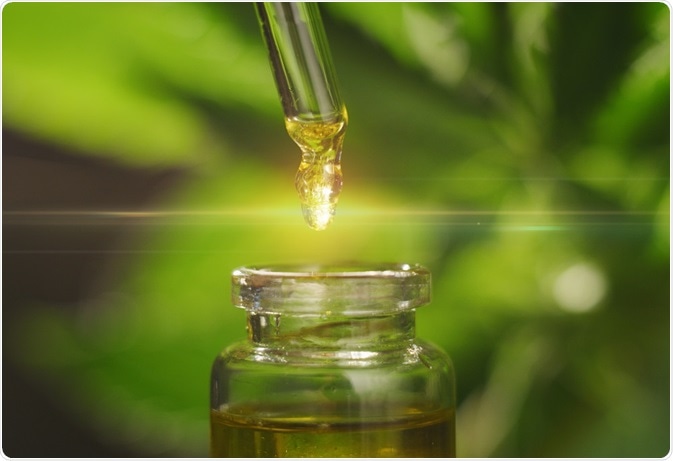Over the past decade, a considerable amount of scientific research has been focused on investigating the potential anti-neoplastic properties of many compounds that comprise cannabis, particularly cannabidiol (CBD). Despite the fact that CBD exhibits various useful anti-cancer properties, its poor water solubility has remained a limiting factor in moving this treatment option forward.
 Image Credit: HQuality/Shutterstock.com
Image Credit: HQuality/Shutterstock.com
Anti-cancer Properties of CBD
Traditionally, cannabis and CBD products have been used to complement radiation and/or chemotherapy cancer treatment for its analgesic, anti-inflammatory, and anti-emetic properties. In addition to serving these purposes, researchers have become increasingly interested in studying whether CBD can also be used to directly reduce tumor size and cancer metastasis. To this end, researchers have studied the mechanisms by which CBD exhibits antitumor activity in both in vitro and in vivo models.
Although the precise mechanisms by which CBD exerts this activity have not been confirmed, research has found that this cannabis constituent is capable of causing cell death by inducing autophagy, apoptosis, and the production of reactive oxygen species (ROS), as well as through the inhibition of angiogenesis, cancer cell invasion and metastasis.
Overcoming the Limitations of CBD
Despite its promising anti-cancer properties, the poor water solubility of CBD severely limits its therapeutic practicality. In an effort to overcome this limitation, researchers have investigated how certain drug delivery systems could be used to carry CBD to its appropriate location in the body.
Of these drug delivery systems include supramolecular host molecules, which can be used to construct host-guest inclusion complexes with small molecule drugs in order to improve their physicochemical properties.
The two most commonly used supramolecular hosts include cyclodextrins (CDs) and cucurbituril (Q[n]). CDs are associated with a wide variety of useful physical and chemical properties include excellent bioavailability, solubility, chemical modification, stability, biodegradability, biocompatibility, and low overall toxicity.
Examining the Ideal CBD and Cyclodextrin Inclusion Complex
In addition to the aforementioned properties, CDs have also been shown to significantly improve the water-solubility of hydrophobic molecules when attached through an inclusion complex.
As a result of these findings, a recent study published in the Journal of Drug Delivery Science and Technology investigated the physicochemical properties and pharmacological activities of three different CBD and CD inclusion complexes, of which included α-CD, β-CD, and γ-CD mixed with CBD.
When comparing the solubility of CBD alone, which measured at 6.3 x 10-5 mg/mL, the inclusion complexes of α-CD, β-CD, and γ-CD mixed with CBD exhibited a water solubility of 3.7, 2.1, and 5.3 mg/mL, respectively. These findings demonstrate that CDs were capable of significantly improving the water solubility of CBD.
In order to confirm the solubility of these CBD/CD inclusion complexes, the researchers also performed various water solubility studies that involved mixing an over-saturated complex solution with an aqueous solution for two hours, which was then followed by filtration and evaporation in order to obtain a dried sample for analysis.
Further experiments incorporated into this study included the use of X-ray diffraction (XRD) to confirm the successful incorporation of CBD into each CD cavity.
The thermal properties of the CBD/CD inclusion complexes, which were found to improve following the formation of the inclusion complex with the CDs, were studied by utilizing a thermogravimetric analyzer.
Additionally, the researchers studied the surface morphology of CBD alone as compared to when complexed with the three CDs by scanning electron microscopy (SEM). The SEM results indicated that the CBD/CD inclusion complexes create a strong coupling morphology.
Take-Home Message
The results of the study discussed here demonstrate that the inclusion complexes formed following the mixture of CBD and α-CD, β-CD, and γ-CD each exhibit an improved water solubility and stability as compared to CBD alone, thereby improving the overall therapeutic potential of these complexes as anticancer formulations.
Sources
- Velasco, G., Sanchez, C., & Guzman, M. (2016). Anticancer mechanisms of cannabinoids. Current Oncology 23(2); S23-S32. DOI: 10.3737/co.23.3080.
- Lv, P., Zhang, D., Guo, M., Liu, J., Chen, X., Guo, R., et al. (2019). Structural analysis and cytotoxicity of host-guest inclusion complexes of cannabidiol with three native cyclodextrins. Journal of Drug Delivery Science and Technology 51; 337-344. DOI: 10.1016/j.jddst.2019.03.015.
Further Reading